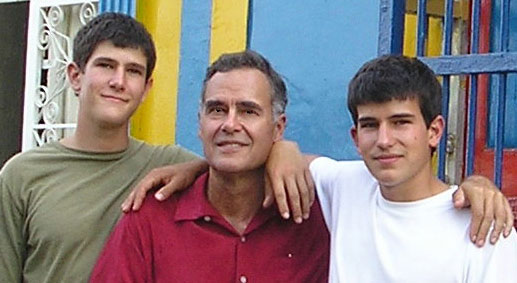
Book Review
Revolutionary Doctors
By Steve Brouwer
Monthly Review Press, 2011, 256 pages, $18.95 paperback, (also available in hardcover and electronic editions)
Steve Brouwer identifies his physician father as the only socialist he knew growing up. The elder Brouwer listened to patients, and he was incensed if they stayed away because of no money. Such early awareness evidently prepared the way for the author’s remarkable book “Revolutionary Doctors.”
Brouwer traces the evolution of Cuba’s health system that has led to Cuban-Venezuelan collaboration in providing health care for their people and medical assistance throughout the world.
His book recovers history, outlines visionaries’ political groundings, and details the activities of Cuban and Venezuelan doctors and medical students.
For Brouwer, Dr. Ernesto “Che” Guevara’s teachings, exemplified in his 1960 speech “On Revolutionary Medicine” , have borne fruit. Che believed, “the best way of telling is doing.” He judged doctors “by their practice of solidarity and equality.”
The book should be an eye-opener for students and those who put serving people first. Touching upon recent Latin American political history, “Revolutionary Doctors” sets the stage by reviewing Latin American expressions of “socialism of the 21st century.” It centers on momentous Cuban-Venezuelan experimentation in medical education, while outlining Venezuela’s efforts to provide health care for 80 percent of its population, previously underserved.
Brouwer explores new doctors’ thinking and assesses their community impact. He describes U.S. government harassment directed at this medical care revolution.
The Bolivarian Alliance of the Peoples of Our America, the solidarity alliance known as ALBA , receives special emphasis. Brouwer reports on Cuba’s Latin American School of Medicine that over six years annually has prepared 1,500 new doctors to take up medical work in dozens of home countries.
The author lived in the hillside village of Monte Carmelo on the outskirts of Sanare, a small city in Venezuela’s northwest. There he came to know people from poor families who, astoundingly, were studying medicine without leaving home. He became acquainted with Cuban doctors who were both caring for patients and teaching the students.
The students and teachers represent a pioneering effort to put 30,000 Venezuelan young people from working-class families on track to become doctors. When in several years they have qualified, another same-sized group will be enrolled. (Several thousand additional medical students continue at tuition-based Venezuelan medical schools.)
Uniquely, medical education takes place in non-institutional settings in rural areas and small cities. Medical educators worldwide know that most young primary care physicians, given the opportunity, like to practice close to where they were trained and/or raised. In Cuba too, medical students increasingly attend schools without walls.
That Cuba since 2004 has maintained some 15,000 physicians in Venezuela is crucial to this endeavor and also to meeting Venezuela’s unmet health care needs. Along with thousands of other health workers, teachers, and “sport-trainers,” Cuban doctors provide basic services, especially in poor urban barrios and rural areas. Newly trained Venezuelan doctors will eventually take over their work. Brouwer’s book details Venezuela’s health care reorganization, the work of Cuban doctors, and the doctors’ Herculean efforts to become pedagogically qualified in order to double as teachers.
Readers learn about tens of thousands of Cuban doctors who’ve worked in over half the world’s countries. Brouwer tells how since 1998 Cuban health workers have provided most of the medical services in Haiti , especially in rural areas. Numbers the author cites testify to the vast scope of this medical revolution. With a combined population of 39 million, Venezuela and Cuba now provide free medical education for 73,000 medical students. By contrast, the United States, population 307 million, is educating 70,000 future doctors.
The medical revolution began in earnest in 2000, says the author, when Cuban leaders proclaimed a “battle of ideas.” The time was ripe for reassertion of socialist values: globalized capitalism reigned supreme and hard times during the waning “special period” had entailed capitalist accommodation. Now, up against an “army in white jackets, Washington strategists are totally unprepared and unequipped mentally to mount a defense.” The Cuban doctors “represent a moral and ethical weapon that is striking at the hollow core of capitalist values.”
“Revolutionary Doctors” deserves wide distribution and reading. (A few proofreading lapses will undoubtedly be corrected in future editions.) This reviewer, mindful of perspective, notes the failure years ago of a U.S. attempt to launch a community health center movement. Planners serving President Lyndon Johnson’s “war on poverty” used the writings and experience of the Israeli and South African physician Sidney Kark, among others, to develop health centers attending to the health needs of the community. Ultimately, isolation of services for poor people and reliance upon precarious funding mechanisms stymied a project carried out under capitalist rules.
Readers should note that Cuba’s health care efforts began long ago. Writing in the New England Journal of Medicine, Robert Ubell in 1983 noted Cuba’s burgeoning specialty medical services, growing research capabilities, effective first-contact and preventative health care, doctors working abroad, and new medical schools and hospitals. He describes “a national medical program that is the envy of many developing nations. For some of these nations, it is not Boston, Massachusetts, but Havana, Cuba, that is the center of the medical world.”












Comments